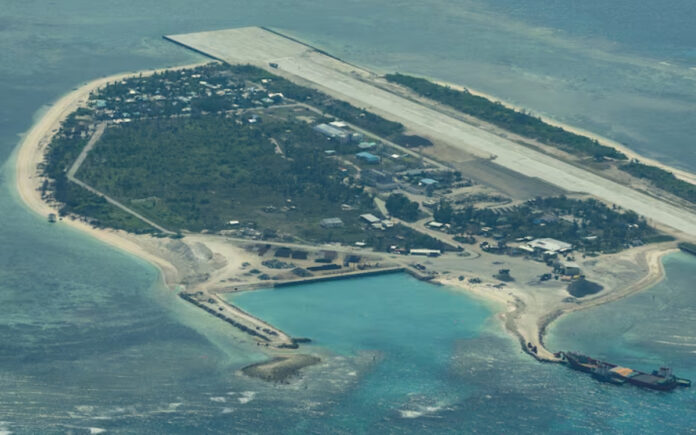Manila: The Philippines announced on Saturday that it had halted a scientific survey in the South China Sea following what it described as “harassment” and aggressive actions by China’s coast guard and navy.
Tensions between Manila and Beijing have been escalating in the disputed waters of the South China Sea. China claims nearly the entire strategic waterway, through which $3 trillion in global trade passes annually, overlapping sovereignty claims from the Philippines, Indonesia, Malaysia, and Vietnam.
On Friday, two Philippine fisheries vessels, en route to collect sand samples from Sandy Cay near Philippine-occupied Thitu Island, encountered “aggressive manoeuvres” by three China Coast Guard ships, according to a statement from the Philippine Coast Guard.
In response, the China Coast Guard affirmed its “indisputable sovereignty” over the Spratly Islands, which include Sandy Cay, referred to by China as Tiexian Reef. It stated that it intercepted the two Philippine vessels and drove them away “in accordance with law.”
The China Coast Guard further claimed that the Philippine vessels had entered waters near Tiexian Reef without permission and attempted to “illegally” land on the reef to collect sand samples.
Both the Philippine embassy in Beijing and the Chinese embassy in Manila did not immediately respond to requests for comment.
Also Read | Archbishop Anastasios, Advocate of Interfaith Dialogue, Dies at 95
The Philippine Coast Guard reported that China deployed four small boats from its larger coast guard vessels to “harass” two rigid-hull inflatable boats used by the fisheries bureau to transport personnel to Sandy Cay. Additionally, a Chinese navy helicopter hovered over the watercraft at an “unsafe altitude”.
As a result of the continuous harassment and the safety risks posed by Chinese maritime forces, the Philippine Coast Guard announced the suspension of the survey operations.
Also Read | Putin Calls Trump ‘Clever’ and ‘Pragmatic’, Advocates for U.S.-Russia Talks
Despite the tensions, Manila and Beijing agreed on January 16 to explore opportunities for cooperation during a round of talks, aiming to find common ground despite their ongoing territorial disputes in the South China Sea.
In 2016, an international arbitration tribunal ruled that China’s claims, based on historical maps, have no legal standing under international law. Beijing, however, has consistently refused to recognize the ruling.



